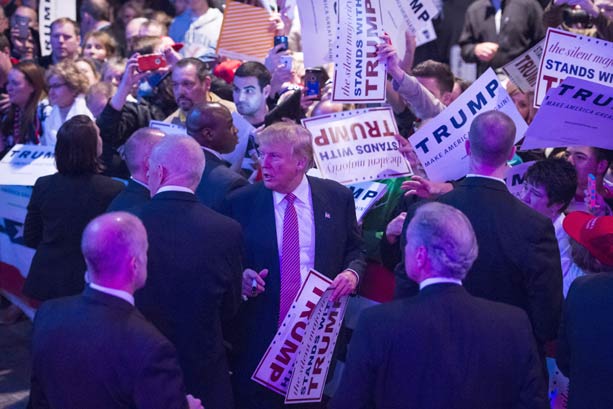
Robert Kagan, a neoconservative writer, has a theory about Donald Trump: He has risen to the top of the Republican field because the party has taught its members to value obstruction and hate President Barack Obama.
The more detail Kagan puts into his case, the less plausible it appears. So, for example, he decries "the persistent calls for nullification of Supreme Court decisions" as the kind of thing that led to Trump -- who has said very little about Supreme Court decisions and nothing about nullification. If "the party's wild obstructionism" was the portent, then why is the leading primary candidate the guy who keeps promising to make deals?
If Kagan's theory were true, we would expect Trump to be doing better with Republican voters who consider themselves "very conservative" than with those who call themselves "somewhat conservative" or "moderate." It's the "very conservative" voter who, presumably, has most internalized the party's anti-Obama message over the last few years. The exit-poll data contradict Kagan's theory. In 12 of the 15 states for which we have numbers, Trump did worse among "very conservative" voters than among voters in general.
Kagan's method is not to amass evidence and then reach a conclusion, but rather to assume that Trump's run must illustrate everything he dislikes about Republican conduct in recent years. But Kagan is far from alone in this fault. Much of the commentary about Trump consists of people finding validation for things they already believed. Usually that validation involves oversimplifying the sources of Trump's support.
Those whose top concern is tighter control of immigration say that issue is the main reason Trump is winning. It has certainly contributed to his victories. What has gotten less attention is that Trump has also done well among voters who favor giving legal status to illegal immigrants.
Many commentators assure us that Trump's success is all about the economic turmoil of white voters without college degrees and the failure of Republicans to respond adequately to it. Those voters favor Trump at relatively high rates. But Trump has also been doing well among voters with college degrees, winning pluralities among them in several states.
Evangelical support for Trump has been widely discussed -- but usually without the recognition that "Trump has failed to earn a majority of evangelicals in any southern state thus far and a vast super-majority of evangelicals have consistently supported other candidates," as political scientist Darren Patrick Guerra recently put it.
Another oversimplification holds that Trump voters are consumed with anger toward the Republican establishment. This description fits some of them. But overall that sentiment doesn't seem to be driving support for Trump. In Georgia, which Trump won, most voters in the exit poll said they felt "betrayed" by Republican politicians -- but Trump actually performed slightly better among those who disagreed.
There are several streams that feed Trump's river. Some of his voters are working-class whites who feel Republicans aren't looking out for them; some of them want to deport all illegal immigrants; some of them want to overthrow a hated Republican establishment; some of them admire Trump as a successful businessman and think he would run the government well too. Some of his supporters even like Mitt Romney -- maybe because he too is a successful businessman. And, of course, some small number of them, all too amply represented on Twitter, are David Duke and his friends.
An oversimplified view of Trump's coalition can lead us to mistaken conclusions. If we think that all of his supporters are bigots, for example, we will have an unfair and alarming view of a large share of our fellow citizens. If we think that they are all dead-set against Republican politicians, we will assume that anti-Trump statements by those politicians are futile efforts, or assume that all of them will be furious if a divided convention nominates someone other than Trump.
And if those of us who are pundits assume that we already know everything worth knowing -- even in the face of genuinely surprising phenomena that few of us predicted, like Trump's rise -- then we'll be even more insufferably self-satisfied than we already are.
Comment by clicking here.
Ramesh Ponnuru has covered national politics and public policy for 18 years. He is an author and Bloomberg View columnist.



 Contact The Editor
Contact The Editor
 Articles By This Author
Articles By This Author